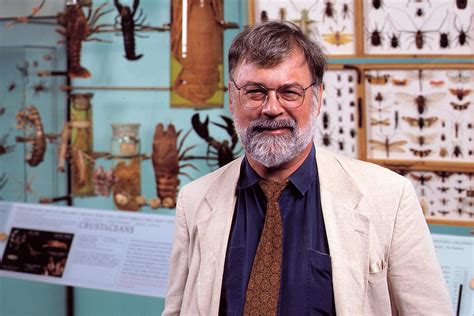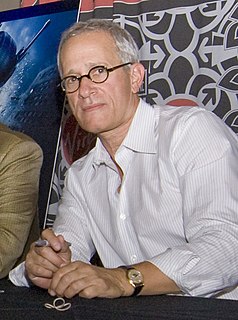A Quote by David M. Raup
A large number of well-trained scientists outside of evolutionary biology and paleontology have unfortunately gotten the idea that the fossil record is far more Darwinian than it is. This probably comes from the oversimplification inevitable in secondary sources: low-level textbooks semipopular articles, and so on. Also, there is probably some wishful thinking involved. In the years after Darwin, his advocates hoped to find predictable progressions. In general. these have not been found-yet the optimism has died hard and some pure fantasy has crept into textbooks.
Quote Topics
After
Also
Articles
Been
Biology
Darwin
Died
Evolutionary
Evolutionary Biology
Fantasy
Far
Find
Fossil
Found
General
Gotten
Hard
His
Hoped
Idea
Inevitable
Involved
Large
Level
Low
Low-Level
More
Number
Optimism
Outside
Oversimplification
Paleontology
Predictable
Pure
Record
Scientists
Secondary
Some
Sources
Textbooks
Than
Thinking
Trained
Unfortunately
Well
Wishful
Wishful Thinking
Years
Related Quotes
Students using astrophysical textbooks remain essentially ignorant of even the existence of plasma concepts, despite the fact that some of them have been known for half a century. The conclusion is that astrophysics is too important to be left in the hands of astrophysicists who have gotten their main knowledge from these textbooks. Earthbound and space telescope data must be treated by scientists who are familiar with laboratory and magnetospheric physics and circuit theory, and of course with modern plasma theory.
A Chinese paleontologist lectures around the world saying that recent fossil finds in his country are inconsistent with the Darwinian theory of evolution. His reason: The major animal groups appear abruptly in the rocks over a relatively short time, rather than evolving gradually from a common ancestor as Darwin's theory predicts. When this conclusion upsets American scientists, he wryly comments: "In China we can criticize Darwin but not the government. In America you can criticize the government but not Darwin."
If, nevertheless, textbooks of pharmacology legitimately contain a chapter on drug abuse and drug addiction, then, by the same token, textbooks of gynecology and urology should contain a chapter on prostitution; textbooks of physiology, a chapter on perversion; textbooks of genetics, a chapter on the racial inferiority of Jews and Negroes.
There are about 250,000 different species of fossil plants and animals known . . In spite of this large quantity of information, it is but a tiny fraction of the diversity that [according to the theory] actually lived in the past. There are well over a million species living today and . . [it is] possible to predict how many species ought to be in our fossil record. That number is at least 100 times the number we have found.
Paleontologists had long been aware of a seeming contradiction between Darwin's postulate of gradualism, confirmed by the work of population genetics, and the actual findings of paleontology. Following phyletic lines through time seemed to reveal only minimal gradual changes but no clear evidence for any change of a species into a different genus or for the gradual origin of an evolutionary novelty. Anything truly novel always seemed to appear quite abruptly in the fossil record.
It could be that at some earlier time, somewhere in the universe, a civilization evolved by probably some kind of Darwinian means to a very, very high level of technology- and designed a form of life that they seeded onto perhaps this planet. And I suppose it's possible that you might find evidence for that if you look at the details of biochemistry, molecular biology, you might find a signature of some sort of designer.
We still do not know the mechanics of evolution in spite of the over-confident claims in some quarters, nor are we likely to make further progress in this by the classical methods of paleontology or biology; and we shall certainly not advance matters by jumping up and down shrilling, `Darwin is god and I, So-and-so, am his prophet'
We have seen the civil rights movement insist on re-writing many of the textbooks in our universities and schools. The labor unions likewise insist that textbooks be fair to the viewpoints of organized labor. Other interested citizens groups have not hesitated to review, analyze and criticize textbooks and teaching materials.

































